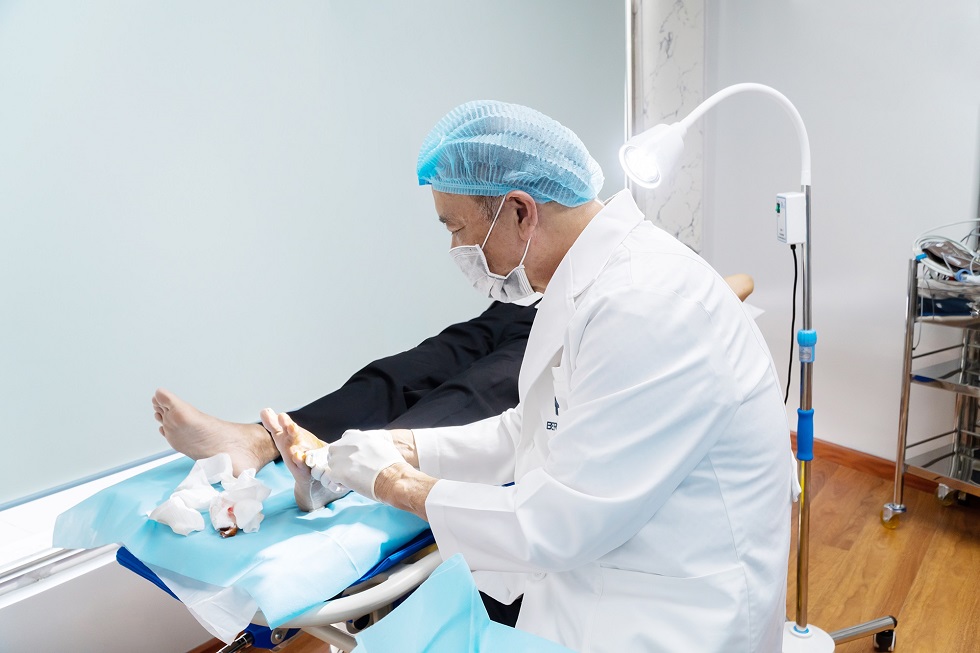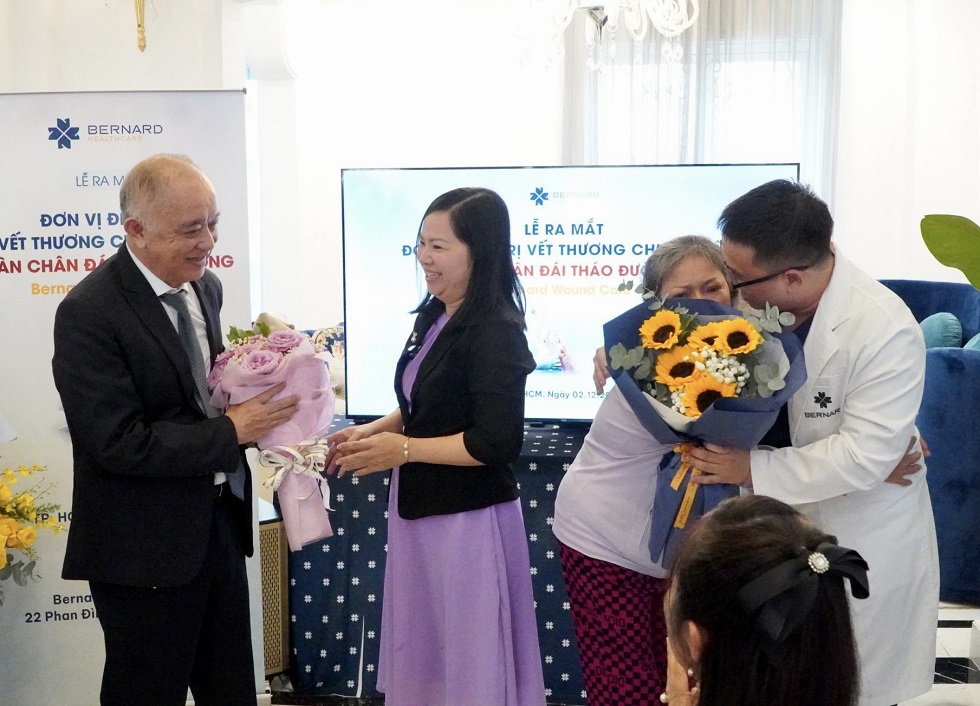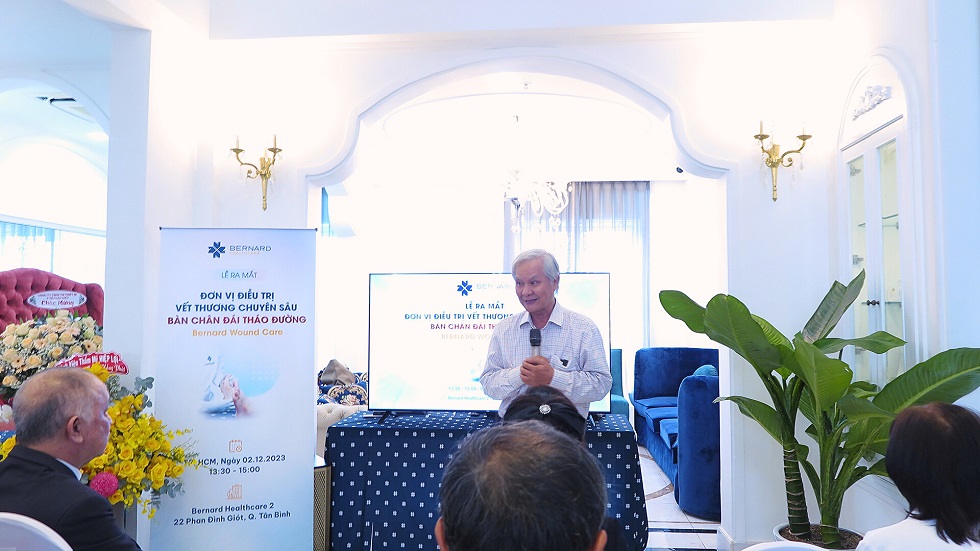On December 2, Bernard Healthcare announced the establishment of a specialized treatment unit named Bernard Wound Care, focusing on chronic wound care, particularly diabetic foot ulcers, burns, and scars at 22 Phan Dinh Giot Street, Tan Binh District, Ho Chi Minh City (HCMC).
The first specialized unit for treating chronic wounds in Ho Chi Minh City
It is reported that the Bernard Wound Care has received and treated over a thousand cases of difficult-to-heal wounds in nearly three years before officially becoming a specialized outpatient unit. Among them, patients with diabetic foot ulcers account for more than 50% of the total number of wound cases, and there are also other common difficult-to-heal wounds such as venous ulcers, arterial ulcers, pressure ulcers, burns, and scars. This is considered the first unit specializing in the treatment of chronic wounds in Ho Chi Minh City.
At the launch event, Prof. Dr. Le Truong Giang, President of the Public Health Association of Ho Chi Minh City, said, “Bernard, a private healthcare facility, is passionate and has invested substantially in the field of wound care without emphasizing economic benefits. This is something I greatly admire. The Public Health Association of Ho Chi Minh City is willing to participate in bringing this wound care unit to the community, providing care for those in need who may lack financial resources and health conditions.”
Mrs. Nguyen Nam Phuong, CEO of Bernard Healthcare, said: “The medical field is challenging, and wound care is even more demanding. From the perspective of private healthcare, if we think about business and profits, Bernard would not typically invest in wound care. Most wound care patients face difficult circumstances while pursuing a treatment that can extend over many months, incurring high costs.”
Chronic wounds – The silent epidemic
Dr. Tran Doan Dao, Chairman of the Medical Advisory Council of Bernard Healthcare and former Head of the Burns and Plastic Surgery Department at Cho Ray Hospital, said: “Wounds appear in almost every medical specialty; no specialty is an exception. A wound that is not cared for, treated correctly, and promptly can lead to chronic non-healing wounds, with the risk of infection, necrosis causing pain, and the consequence of amputation of limb sections.”
In essence, chronic non-healing wounds are wounds that do not heal within 4-8 weeks. Any wound can become chronic, especially in patients with underlying conditions such as diabetes, chronic venous insufficiency, or heart failure. Currently, globally, chronic non-healing wounds are considered a “silent epidemic”, reducing the quality of life for patients and increasing economic pressure on society. For instance, a diabetic foot ulcer patient requires 200 days of treatment for healing, while a pressure ulcer takes 223 days to heal. In Vietnam, there is a significant demand for wound care and treatment, but wound care specialization is a relatively new field.

The establishment of the specialized wound treatment unit Bernard Wound Care is of great significance, contributing to “pain reduction, healing promotion, and complication limitation.” It serves as a reliable place for people to confidently seek examination and treatment, allowing wound patients access to advanced treatment methods.
Bernard Wound Care, focusing on diabetic foot ulcers, also emphasizes professional training. Experts from Bernard Wound Care participate in teaching and presenting at reputable Wound Conferences and Vascular Conferences worldwide. Bernard Wound Care has strategically collaborated with healthcare institutions in the region (Singapore and Taiwan) and plans to expand professional cooperation with specialized wound centers worldwide (Europe and the United States) to enhance service quality and provide the best treatment opportunities for patients, Dr. Tran Doan Dao said.

In the announcement ceremony, the book “Wound Care,” edited by Dr. Tran Doan Dao along with collaborators, was introduced. The book is divided into 2 chapters covering various topics related to common wounds, such as fluid wounds, pressure injuries, diabetic foot ulcers, peripheral arterial ulcers, burns and scars.
As a specialized book, compiled and non-commercially printed (not for sale), with the purpose of sharing specialized knowledge in wound care and treatment, the book “Wound Care” has received positive feedback from leading experts and inspired medical students, young doctors, and nurses entering the field of wound care, contributing to the training and development of healthcare personnel in this field in Vietnam.
In the future, the Public Health Association of Ho Chi Minh City and Bernard Wound Care will implement community programs, screening to prevent complications of diabetes-related ulcers, and provide free examinations and treatments for patients with difficult-to-heal wounds facing difficult circumstances.
Bernard Wound Care (under the Bernard Healthcare System) brings together a team of highly specialized and reputable doctors with extensive experience in the field of wound care in Vietnam. They have received advanced training in wound management in Europe, the United States, and Asia. The unit is equipped with modern facilities (MRI, CT, ultrasound, ABI/TBI…) and employs cutting-edge wound treatment technologies in line with global trends (negative pressure therapy, compression therapy, bioactive dressings, etc.). The unit follows standardized protocols and utilizes a multidisciplinary approach with the goal of “pain reduction, healing promotion, and complication limitation.” The treatment focuses on preserving and aesthetically healing wounds, as well as preventing recurrence through personalized treatment plans. Additionally, in-depth monitoring includes nutritional counseling and guidance on post-treatment wound care at home, with a specific focus on diabetic foot ulcers, burns, and scars.











